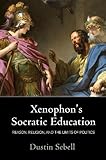Xenophon's Socratic Education : Reason, Religion, and the Limits of Politics / Dustin Sebell.
Material type: TextPublisher: Philadelphia : University of Pennsylvania Press, [2021]Copyright date: ©2021Description: 1 online resource (240 p.)Content type:
TextPublisher: Philadelphia : University of Pennsylvania Press, [2021]Copyright date: ©2021Description: 1 online resource (240 p.)Content type: - 9780812297843
- 183.2 23
- online - DeGruyter
| Item type | Current library | Call number | URL | Status | Notes | Barcode | |
|---|---|---|---|---|---|---|---|
 eBook
eBook
|
Biblioteca "Angelicum" Pont. Univ. S.Tommaso d'Aquino Nuvola online | online - DeGruyter (Browse shelf(Opens below)) | Online access | Not for loan (Accesso limitato) | Accesso per gli utenti autorizzati / Access for authorized users | (dgr)9780812297843 |
Browsing Biblioteca "Angelicum" Pont. Univ. S.Tommaso d'Aquino shelves, Shelving location: Nuvola online Close shelf browser (Hides shelf browser)

|

|

|

|

|

|

|
||
| online - DeGruyter The Marvels of the World : An Anthology of Nature Writing Before 1700 / | online - DeGruyter American Freethinker : Elihu Palmer and the Struggle for Religious Freedom in the New Nation / | online - DeGruyter The Ecology of Homicide : Race, Place, and Space in Postwar Philadelphia / | online - DeGruyter Xenophon's Socratic Education : Reason, Religion, and the Limits of Politics / | online - DeGruyter The Fallen Veil : A Literary and Cultural History of the Photographic Nude in Nineteenth-Century France / | online - DeGruyter Survival : A Theological-Political Genealogy / | online - DeGruyter Iberian Moorings : Al-Andalus, Sefarad, and the Tropes of Exceptionalism / |
Frontmatter -- Contents -- Acknowledgments -- Introduction -- PART ONE -- Chapter 1. Socratic Rhetoric -- Chapter 2. Can Politics Be Taught? -- PART TWO -- Chapter 3. Justice and the Weakness of Writing -- Chapter 4. Self- Knowledge and the Hope for Happiness -- PART THREE -- Chapter 5. “Natural Theology” -- Chapter 6. “Natural Law” -- Chapter 7. The Foundation of Wisdom -- Chapter 8. The (Rhetorical Treatment of the) Dialectical Method -- Chapter 9. Human Wisdom and Divine Providence -- Notes -- Index
restricted access online access with authorization star
http://purl.org/coar/access_right/c_16ec
It is well known that Socrates was executed by the city of Athens for not believing in the gods and for corrupting the youth. Despite this, it is not widely known what he really thought, or taught the youth to think, about philosophy, the gods, and political affairs. Of the few authors we rely on for firsthand knowledge of Socrates—Aristophanes, Xenophon, Plato, and Aristotle—only Xenophon, the least read of the four, lays out the whole Socratic education in systematic order.In Xenophon's Socratic Education, through a careful reading of Book IV of Xenophon's Memorabilia, Dustin Sebell shows how Socrates ascended, with his students in tow, from opinions about morality or politics and religion to knowledge of such things. Besides revealing what it was that Socrates really thought—about everything from self-knowledge to happiness, natural theology to natural law, and rhetoric to dialectic—Sebell demonstrates how Socrates taught promising youths, like Xenophon or Plato, only indirectly: by jokingly teaching unpromising youths in their presence. Sebell ultimately shows how Socrates, the founder of moral and political philosophy, sought and found an answer to the all-important question: should we take our bearings in life from human reason, or revealed religion?
Mode of access: Internet via World Wide Web.
In English.
Description based on online resource; title from PDF title page (publisher's Web site, viewed 01. Dez 2022)


